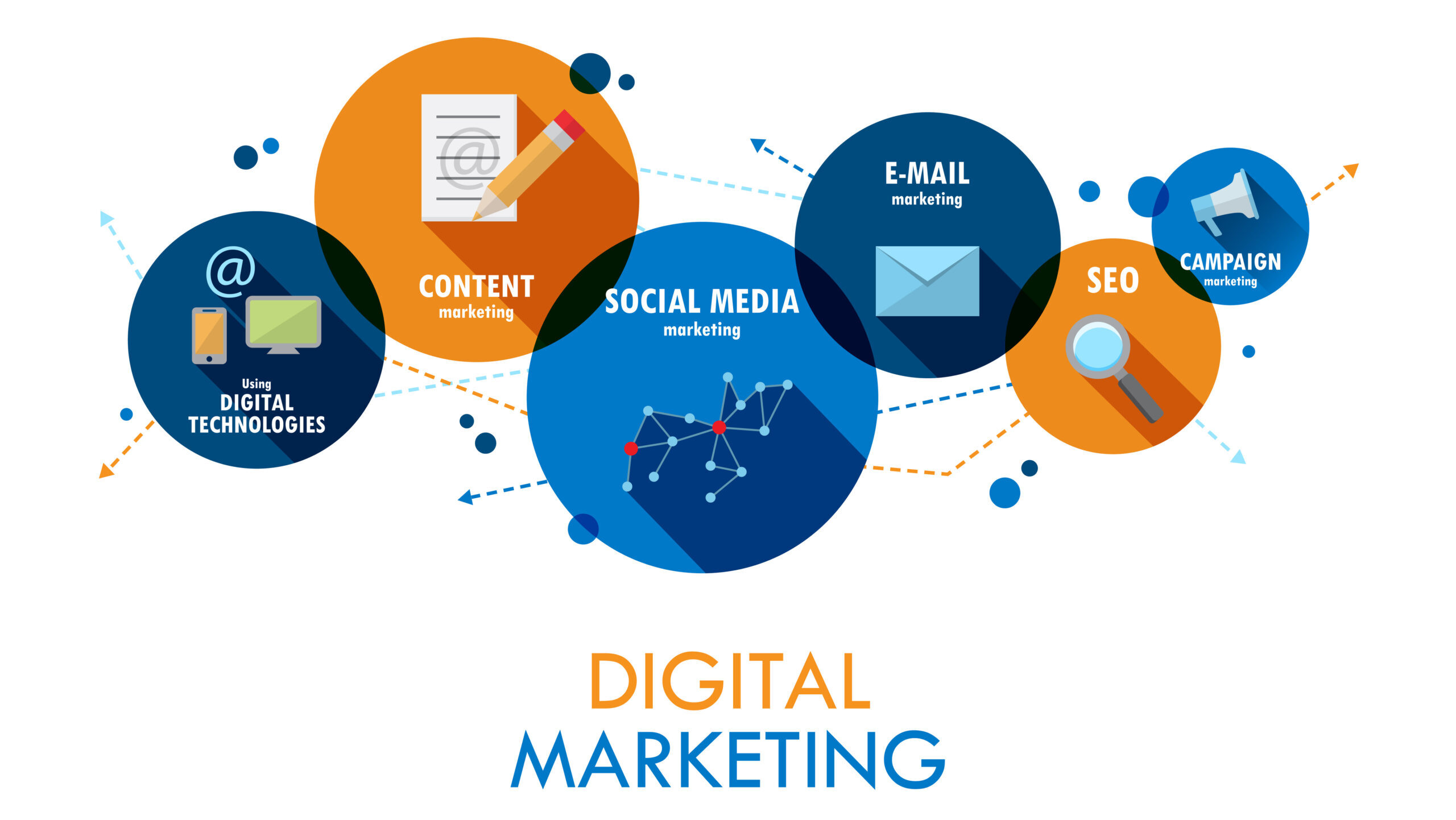
What is Digital Marketing? Key To Modern Success
What is Digital Marketing? Key To Modern Success
Quick Links
- What is Digital Marketing?
- Understanding Digital Marketing
- Inbound marketing vs. digital marketing
- Importance of Digital Marketing Today
- How Does Digital Marketing Work?
- >Exploring Online Marketing Channels
- Search Engine Optimisation (SEO) Basics
- Search Engine Marketing (SEM) Techniques
- Crafting a Content Marketing Strategy
- Engaging in Social Media Marketing (SMM)
- Effective Influencer Marketing
- Affiliate Marketing Insights
- Mastering Email Marketing
- OTT Advertising Essentials
- SMS Marketing Strategies
- Integrating Omnichannel Digital Marketing
- Steps to Create a Digital Marketing Strategy
- Digital Marketing Challenges
- How Can You Become a Digital Marketer?
- Partnering with a Digital Marketing Agency
- FAQ
Digital marketing is like the GPS guiding businesses through the ever-changing online landscape to find success.
I once knew a small cafe owner who doubled her revenue simply by embracing social media marketing.
With more than 4.9 billion active internet users, digital marketing is the key to reaching them, engaging, and enhancing their customer journey by converting them into loyal customers.
Key point
- Digital marketing leverages online channels to promote products or services.
- It includes methods like SEO, pay-per-click (PPC), social media marketing, and content marketing.
- These strategies help businesses connect with their target audience, engage them, and turn them into customers.
- Businesses of any size, budget, or industry can use digital marketing to attract customers.
- For an effective digital marketing strategy: research your audience, set goals, choose channels, and track results.
What is Digital Marketing?
Digital marketing is your ultimate toolkit.
It allows you to connect with audiences and craft strategies that resonate. From websites to social media platforms or even online ads, digital marketing covers all digital channels that enable businesses to reach their target audiences, drive engagement, and conversion rates.
This approach isn’t just about flashy marketing tactics but about understanding what customers want, personalising your approach, and getting products or services in front of the right people.
Essentially, digital marketing is a powerful method for online success. By harnessing effective tools, businesses can reach potential customers who are actively searching for products and solutions.
In New Zealand, businesses rely heavily on leveraging digital marketing for establishing strong digital footprints, to capture both local and international markets. With internet penetration rates exceeding 93% and mobile usage continuing to rise, digital marketers have endless opportunities to utilise various digital channels effectively.
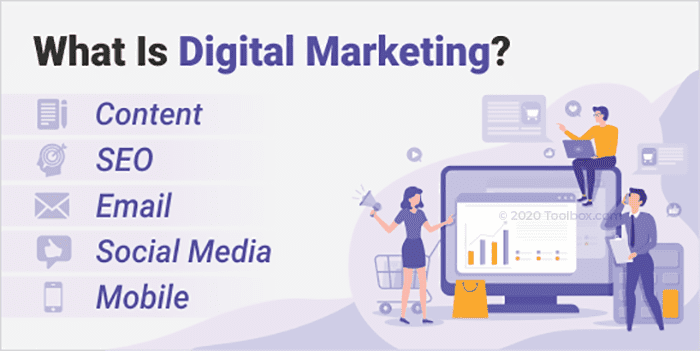
Understanding Digital Marketing
At its core, digital marketing is the strategy of connecting with potential customers online where they spend most of their time.
With the world increasingly moving online, businesses must adopt digital marketing as a primary means of communication. But what is digital marketing?
It’s the strategy that involves leveraging online tools and platforms to connect with potential customers where they spend most of their time, ensuring engagement and conversion. Think about the times you’ve searched for a product online or followed a brand on social media. These interactions are digital marketing in action, designed to grab your attention and inform your purchasing decisions.
Essentially, digital marketing taps into a range of online platforms to help businesses present their offerings. From tailored emails to engaging social media posts, companies can experiment and discover what works best for their market.
The beauty of digital marketing and marketing automation lies in their adaptability to different industries, budgets, and scales, supporting businesses in achieving their marketing goals. By analyzing customer data and feedback, marketers refine their approaches for maximum effectiveness.
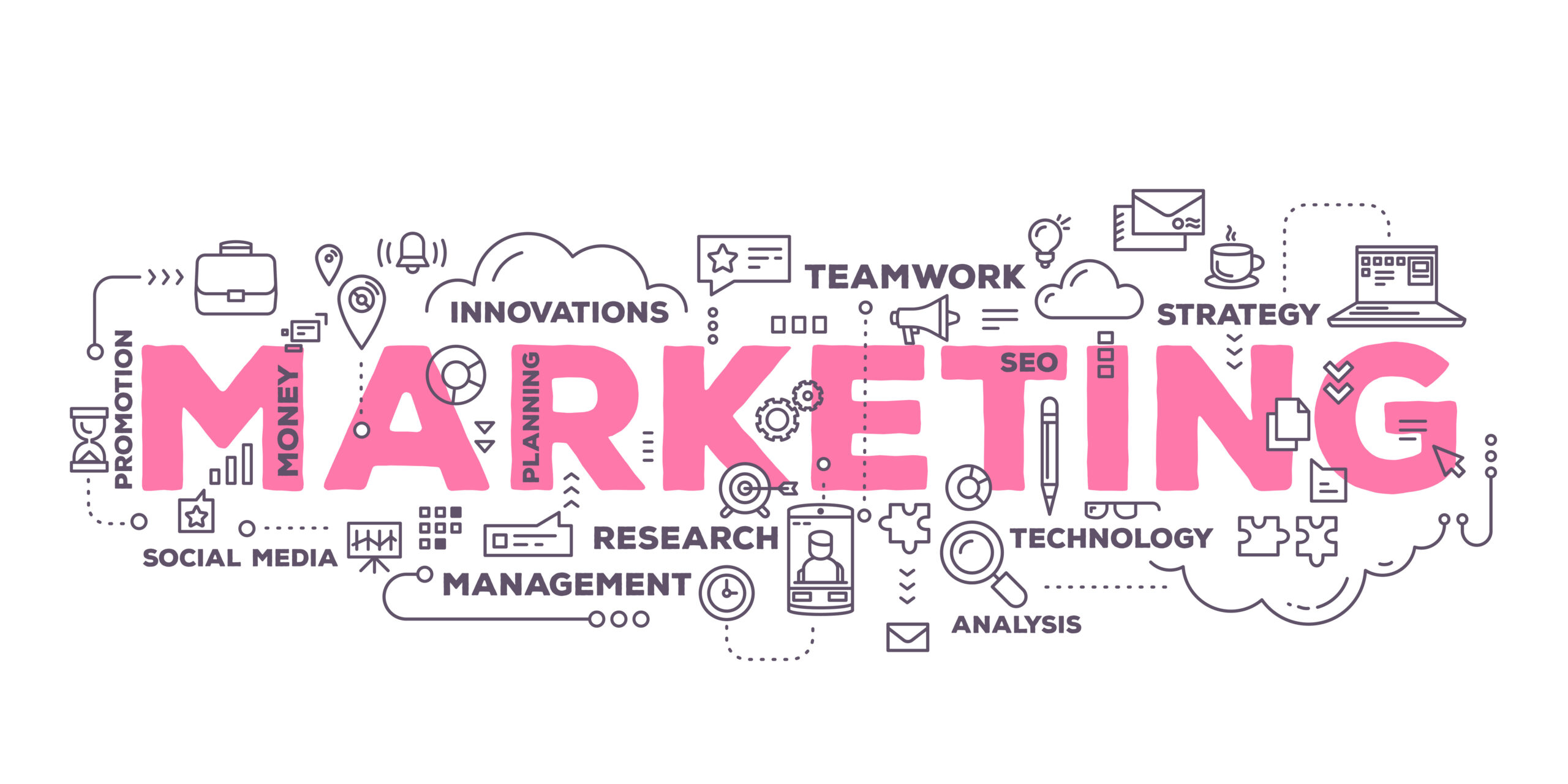
Inbound marketing vs. digital marketing
Digital marketing and inbound marketing often get mixed up, and it’s easy to see why. Both use similar tools like email and online content to grab prospects’ attention throughout their buying journey and convert them into customers. However, they approach the relationship between tools and goals differently.
Digital marketing focuses on how individual tools or channels can convert prospects. A brand’s strategy might spread across multiple platforms or concentrate on just one. For instance, a company might focus heavily on social media and email marketing while skipping other digital avenues.
Inbound marketing, on the other hand, is more holistic. It starts with the goal, then identifies the best tools to reach target customers and determines the right stage in the sales funnel to engage them. For example, if you aim to boost website traffic to generate leads, you might prioritize search engine optimization in your content marketing strategy, leading to more optimized blogs, landing pages, and more.
The key takeaway is that you don’t have to choose between digital and inbound marketing. They complement each other well. Inbound marketing gives structure and purpose to digital marketing efforts, ensuring each channel works towards a specific goal.
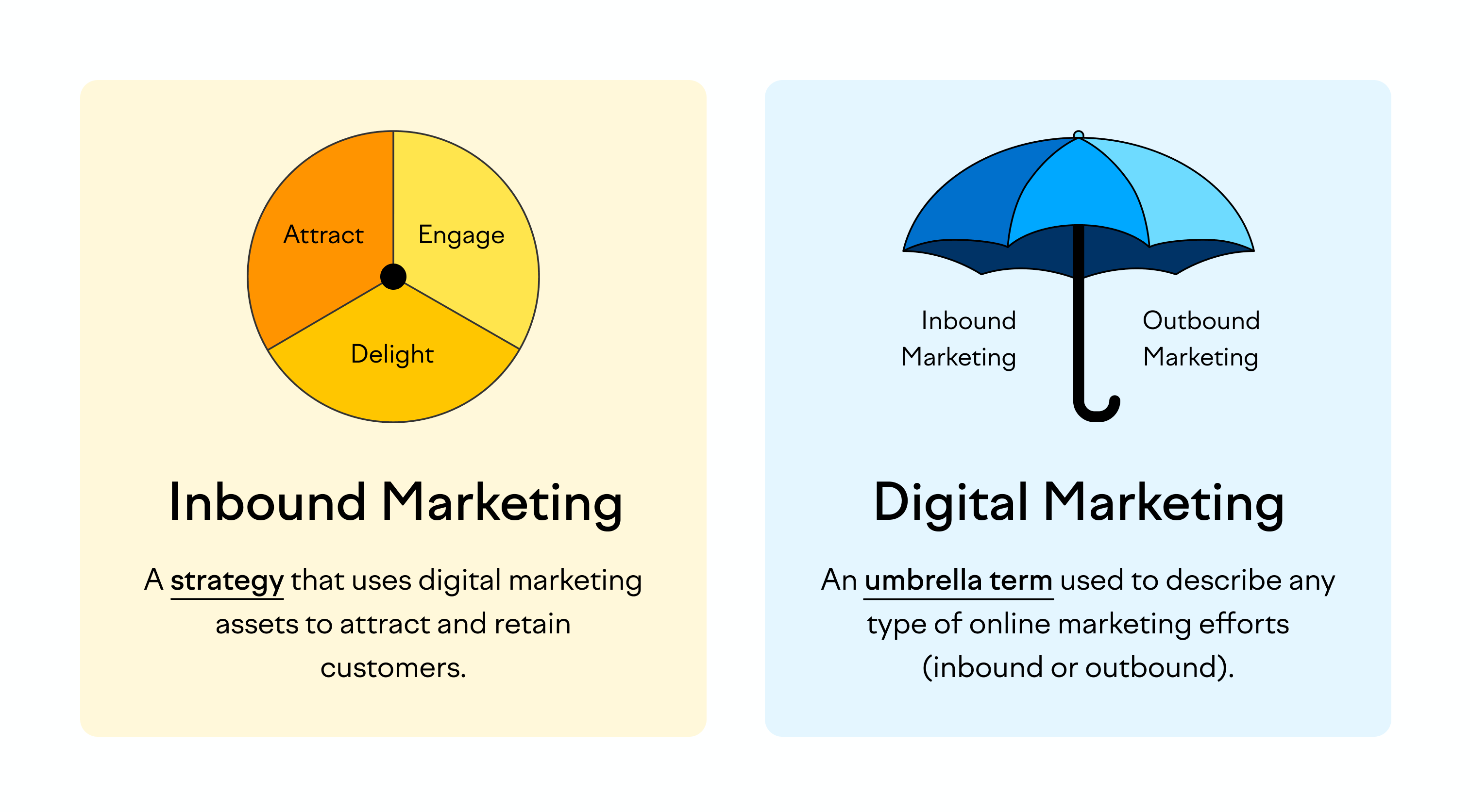
Image Source: SEMrush
Importance of Digital Marketing Today
Digital marketing is everywhere you look.
In today’s digital-first world, businesses must embrace digital marketing to survive and thrive.
It opens the door to increasing brand awareness and reaching an expansive online audience, enabling brands to tailor their messages in meaningful and impactful ways. Moreover, it provides the tools for analysing and understanding customer behavior, ensuring campaigns deliver real results.
Consumers expect to interact with brands through digital marketing channels online every single day. It’s not just about reaching customers—it’s about creating relationships by understanding its strategic applications, including search engine optimization.
As Technology Evolves
The constant evolution of digital marketing means companies need to stay sharp, especially as we approach 2023 with technologies like AI and VR advancing rapidly. Their potential to revolutionise digital marketing strategies offers exciting opportunities for those ready to adapt and innovate.
Cost efficiency
Digital marketing not only reaches a wider audience than traditional methods but also does so at a lower cost. Traditional marketing avenues like newspaper ads and TV spots come with high overhead costs and offer less control over reaching your target audience.
With digital marketing, you can create a single piece of content that continuously attracts visitors to your blog. You can also set up an email marketing campaign to send messages to targeted customer lists on a schedule, easily adjusting the timing or content as needed.
Overall, digital marketing offers greater flexibility and more direct customer engagement for your advertising spend.
Quantifiable results
To determine if your marketing strategy is effective, you need to know how many customers it attracts and the revenue it generates. But how do you measure that with non-digital marketing?
Traditionally, you might ask customers, “How did you find us?” However, this approach doesn’t work for every industry. Many companies don’t have the chance for one-on-one interactions with customers, and surveys often yield incomplete results.
With digital marketing, tracking results is straightforward. Digital marketing tools and platforms automatically monitor key metrics like email open rates, homepage visits, and direct purchases, giving you clear insights into your campaign’s performance.
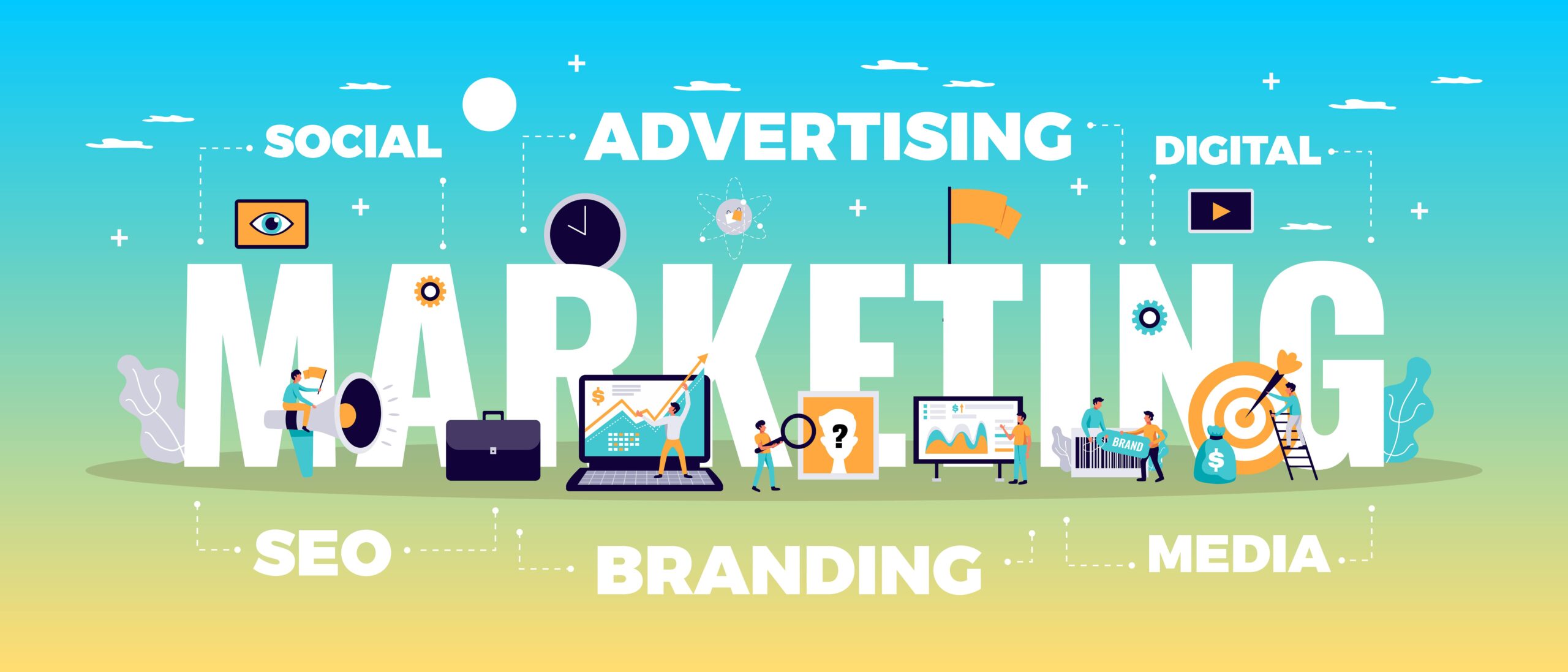
How Does Digital Marketing Work?
Digital marketing offers a variety of approaches to connect with your audience using a wide range of tactics, strategies, and channels. Here’s a general outline of the common steps involved in a digital marketing campaign:
- Define Your Marketing Goals Digital marketing is vast, so it’s crucial to establish your goals before launching a campaign. Are you aiming to build brand awareness, acquire new customers, or focus on retention and loyalty? Clearly defined goals help tailor your strategy and budget for maximum impact.
- Identify Your Target Audience Who are you trying to reach? The more details you gather about your target audience—such as age, location, and income—the easier it becomes to connect with them effectively.
- Choose the Right Marketing Channels and Tactics With a clear understanding of your audience, decide how and where to reach them. For instance, if you’re a B2C marketer targeting younger customers, you might allocate more budget to social media advertising on specific platforms rather than focusing heavily on blog publishing.
- Develop and Optimize Content and Messaging for Each Channel Analyze your data to understand your audience’s preferences. If your customers prefer mobile browsing, ensure your content is optimized for mobile viewing. Since customers interact with brands across various channels in a nonlinear fashion, maintain a consistent brand voice and messaging across all content to prevent confusion about your brand’s identity and value.
- Measure Campaign Performance Across Key Metrics Track key metrics and iterate based on the results. Without measuring performance, you won’t know if your campaign is successful or improving. Regular measurement ensures you’re effectively connecting with customers, driving loyalty, and building brand advocacy.
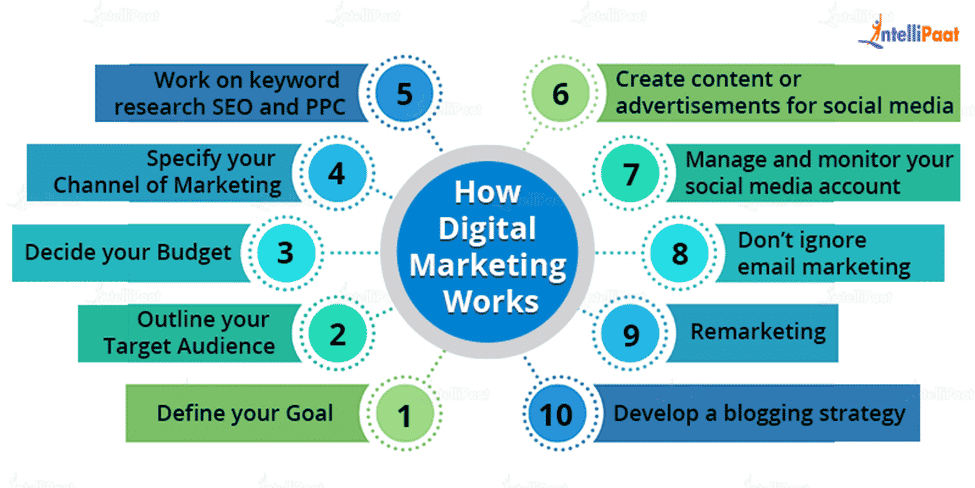
Image and data Source: intellipaat
Exploring Online Marketing Channels
Digital marketing channels are vital for reaching customers where they spend the most time—online.
Think of platforms like Facebook, Google, and TikTok as your marketing playgrounds, where marketing automation can enhance efficiency and effectiveness.
These channels offer opportunities to engage potential customers through paid advertising, targeted social media interactions, and content creation. It’s not just about being present online but crafting a strategy that resonates with your audience.
In the New Zealand Context
In New Zealand’s digital landscape, leveraging multiple online channels ensures your visibility and expands your reach. With a mix of engaging content, precise targeting, and data-driven insights, you can maximise your marketing impact. As they say, “being where your audience is” is more crucial now than ever.
Website Design and Marketing
Your website is typically the first interaction potential customers have with your company and brand. Effective web design ensures consistent branding across all digital assets. It should enhance search engine friendliness, deliver a great user experience, and boost conversion rates, leading to more clicks, sign-ups, and other desired actions.
Search Engine Optimisation (SEO) Basics
Search engine optimization (SEO) is all about enhancing your website and content to perform better in search engines like Google. In New Zealand, where over 93% of people use the internet daily, optimizing your site for search engines is crucial for visibility and attracting organic clicks.
Good SEO boosts your visibility, leading to increased website traffic and more conversions. A well-structured SEO strategy involves:
- Detailed keyword research
- Optimizing pages for readability and user experience (UX)
- Creating high-quality content that generates backlinks
- Improving the layout, responsiveness, and speed of your web pages
In New Zealand’s competitive market, understanding what is SEO and consistent optimization is essential to adapt to ever-changing algorithms. Staying updated with the latest trends and search engine guidelines from major platforms like Google ensures your strategy remains relevant. SEO attracts visitors actively looking for your product or service, but it takes time to see results—often months—but it’s worth the wait and effort.
Here are some examples of what a solid SEO strategy can achieve:
- Universal Technical Institute (UTI) gained 982 number one rankings in Google, a 20% YoY increase.
- CNN grew its search audience by 91 percent over a YoY period.
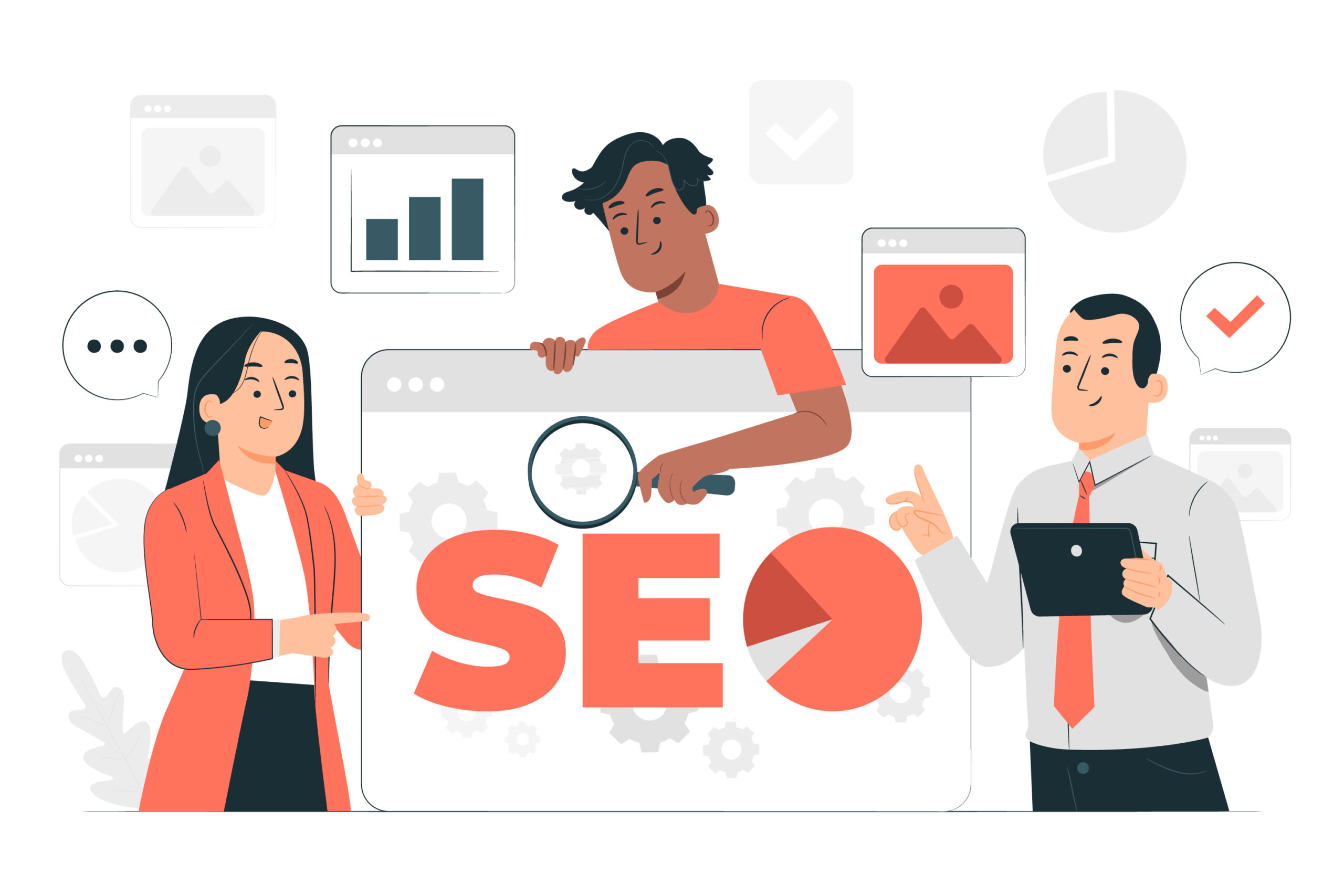
Search Engine Marketing (SEM) Techniques
Search Engine Marketing (SEM) focuses on promoting websites through paid advertisements on search engine results pages to gain immediate visibility. The most popular form of SEM is Pay-Per-Click (PPC) advertising, where you only pay when users click your ad. This method is commonly used on platforms like Google, Facebook, and other social media sites.
SEM operates through an instant auction process. Advertisers bid on specific keywords or target ads to customers matching their key demographics. The SEM platform then selects which ad to display based on several factors, including:
- Bid amount
- Ad relevance
- Ad quality
- Expected ad performance
- Value provided to customers
A key advantage of SEM is its ability to deliver fast results with precise targeting options, allowing businesses to display ads to specific potential customers based on location, demographics, and search keywords. However, SEM can be costly without a well-thought-out strategy and stops working once you stop paying.
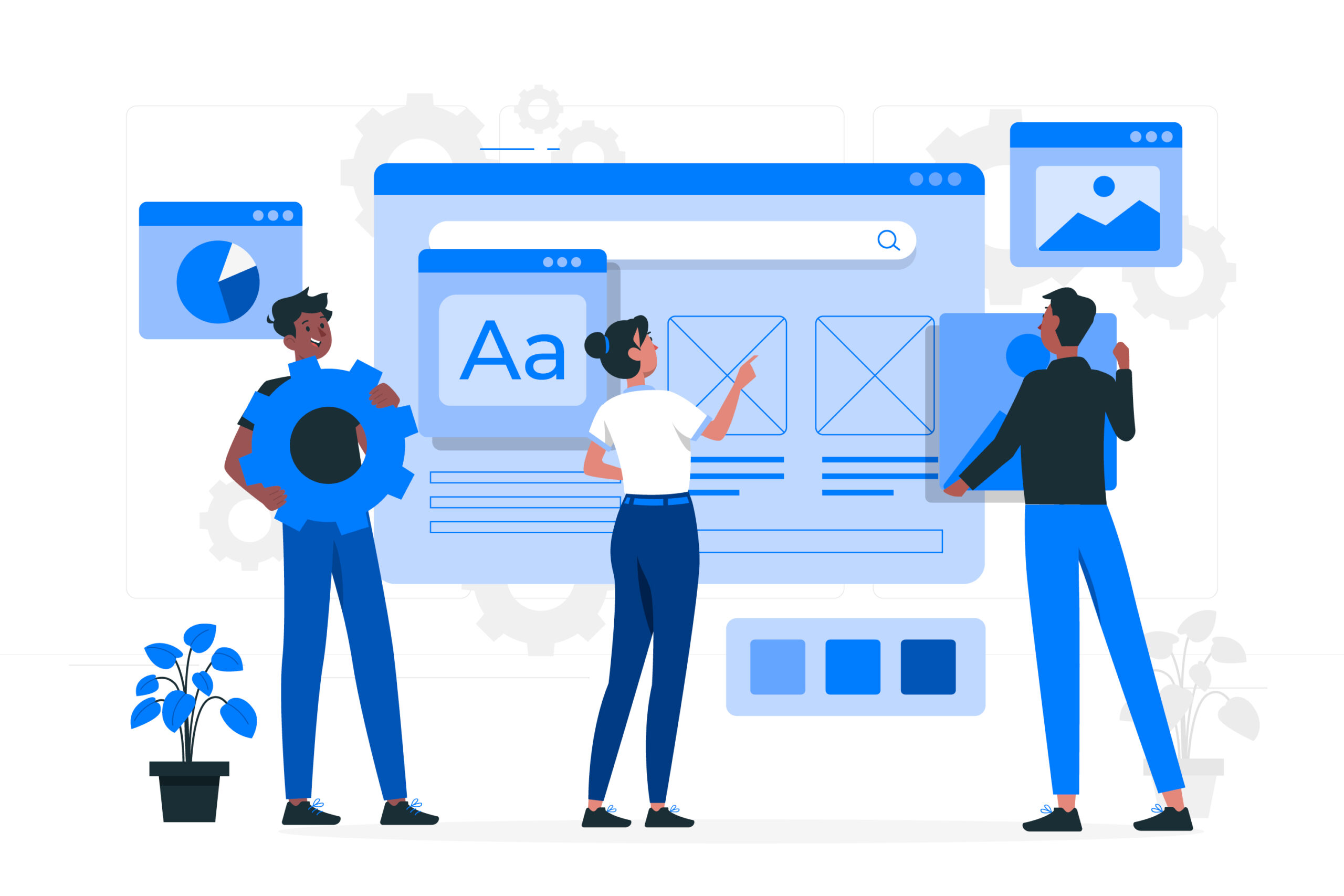
Crafting a Content Marketing Strategy
A strong content marketing strategy tells a compelling story—just like a great novel keeps readers hooked, engaging content keeps your audience coming back. Consistency and value set great content strategies apart by offering solutions, insights, and storytelling that resonate.
High-quality content is essential for SEO, making it a key pillar of content marketing. Unlike traditional ads, content marketing attracts leads by providing free value through blog posts, e-books, newsletters, videos, and infographics.
Data proves content marketing’s impact: 84% of consumers expect brands to create valuable content, 62% of large companies publish content daily, and 92% of marketers see content as a critical business asset.
However, standing out in search results while keeping readers engaged is a challenge. Relevant, high-ranking content builds trust and nurtures strong relationships throughout the pipeline.
To create engaging content, identify your audience and tailor your format—whether it’s blog posts, videos, or downloadable resources. Follow best practices: ensure your content is error-free, easy to understand, and strategically guides readers toward the next step, like a free consultation or signup.
A consistent brand voice across multiple channels strengthens engagement and brand identity. Using tools like content calendars helps align messaging with your goals, ensuring every piece of content drives impact.

Utilising Video Marketing
Video marketing leverages engaging video content to tap into diverse platforms like YouTube.
Back in 2020, Wyzowl found that 84% of people were convinced to buy a product or service by watching a brand’s video. The influence of video has grown exponentially.
It’s about creating a narrative around your brand that captivates the audience. Whether it’s showcasing product demos or customer stories, effectively utilising video can make your brand memorable.
Key to Success
One key to successful video marketing is keeping videos short, targeting attention spans that aren’t what they used to be. Platforms like TikTok and Instagram demonstrate how short videos engage audiences effectively. Creativity and an understanding of your audience’s preferences are essential.

Engaging in Social Media Marketing (SMM)
Social media marketing is a powerful tool for driving traffic, building brand awareness, and fostering engagement by interacting with audiences online. With over 4.9 billion people using social media globally, it has become an essential part of any successful online strategy. Businesses can leverage social media to showcase their brand, products, services, and company culture while reaching potential customers and boosting sales.
The most popular digital platforms for social media marketing are Facebook, X, and Instagram, with LinkedIn and YouTube not far behind. The right platform for your business depends on your goals and target audience. For example, a FinTech startup looking for new leads might focus on LinkedIn, where industry professionals are active, while a B2C brand targeting younger consumers may benefit from Instagram ads.
Social media marketing thrives on audience participation, making it a highly effective way to attract attention. Built-in engagement metrics allow businesses to track interactions such as shares, comments, and website clicks, helping refine strategies and improve reach. While direct purchases may not always be the primary goal, brands often use social media to start conversations and build relationships rather than push immediate sales—especially for products that require consideration or appeal to older audiences.
To create an effective social media marketing strategy, it’s crucial to follow best practices:
- Craft high-quality, engaging content
- Respond to comments and questions professionally
- Develop a social media posting schedule
- Post at optimal times for engagement
- Hire social media managers to enhance efforts
- Understand your audience and their preferred platforms
- Stay on top of trends and algorithm changes by regularly reviewing platform updates
By selecting the right platforms and staying consistent with high-value content, businesses can maximize their social media impact. Leveraging tools like social media management software can further streamline efforts and drive results.
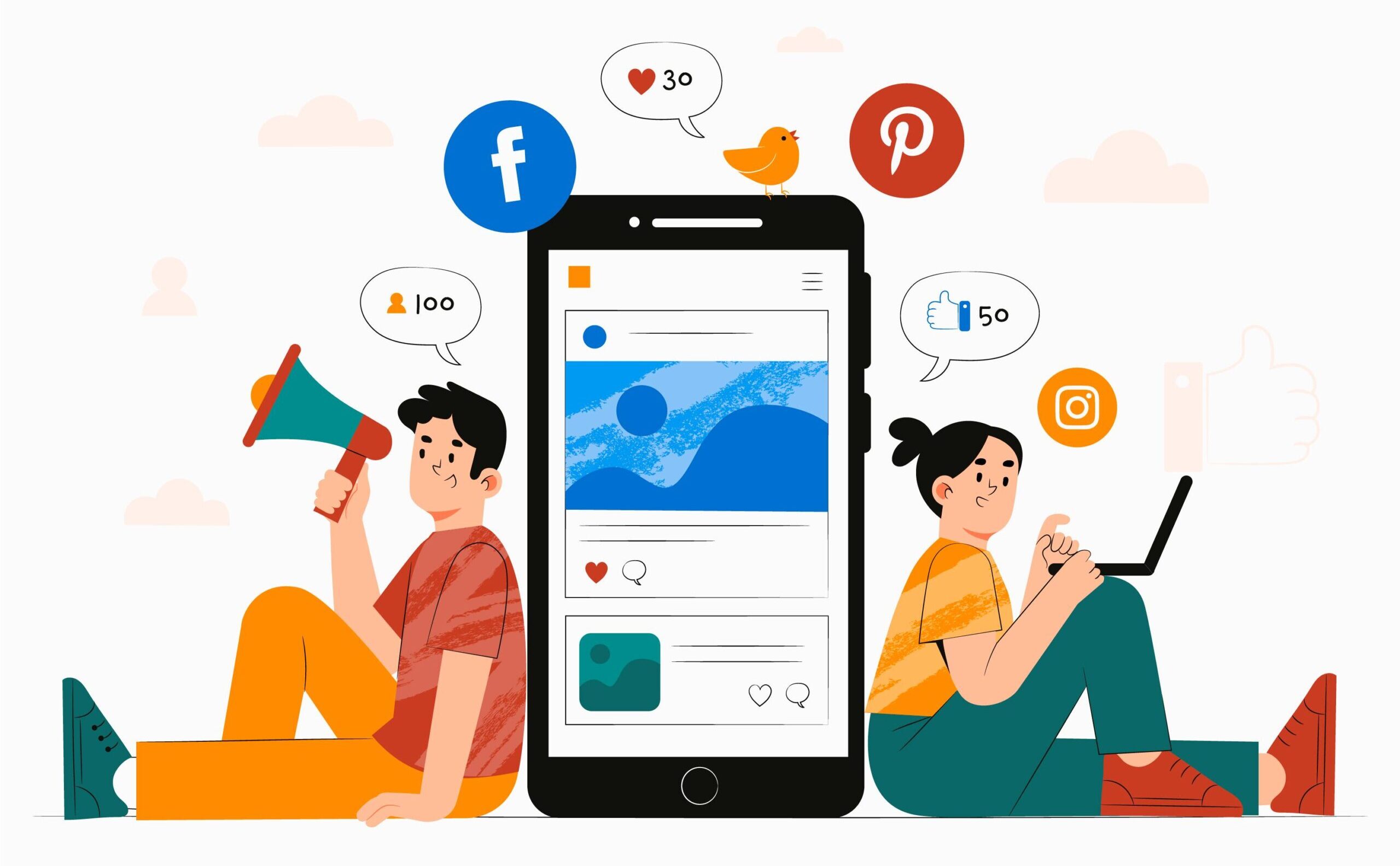
Effective Influencer Marketing
Effective influencer marketing lets brands connect with audiences they might otherwise not reach.
Firstly, choose influencers aligned with your brand values and target audience, ensuring authenticity and trust. Look for influencers whose follower demographics match your ideal customer profile.
Campaign Structuring
Clearly outline campaign goals and deliverables. Allow the influencer creative freedom while ensuring your brand’s message is highlighted.
Evaluate the impact by monitoring metrics such as engagement and conversion rates. This creates lasting partnerships that boost brand visibility and sales.

Affiliate Marketing Insights
Affiliate marketing is a powerful digital marketing strategy that enables individuals to earn money by promoting another business’s products or services. Whether you’re the affiliate promoting the products or the business working with affiliates, the core process remains the same.
This strategy operates on a revenue-sharing model: affiliates earn a commission for every successful sale they drive, while merchants only pay for actual conversions. Essentially, it functions like a virtual sales team, expanding a brand’s reach without significant upfront costs.
Affiliate marketers may choose to promote products from a single company—perhaps through a blog or third-party site—or collaborate with multiple merchants. Businesses, in turn, can leverage affiliate networks or set up direct partnerships to connect with potential promoters.
For retailers looking to attract high-quality affiliates, providing the right tools and incentives is crucial. This includes offering competitive commission rates, marketing materials, and performance-based rewards to drive results. Platforms like Amazon Associates and Rakuten have demonstrated how a well-implemented affiliate program can significantly boost market reach and brand recognition.
Affiliate marketing is a cost-effective way to enhance visibility and sales while ensuring businesses only pay for tangible results. By collaborating with affiliates who have engaged audiences, brands can extend their influence and drive revenue without traditional advertising expenses.
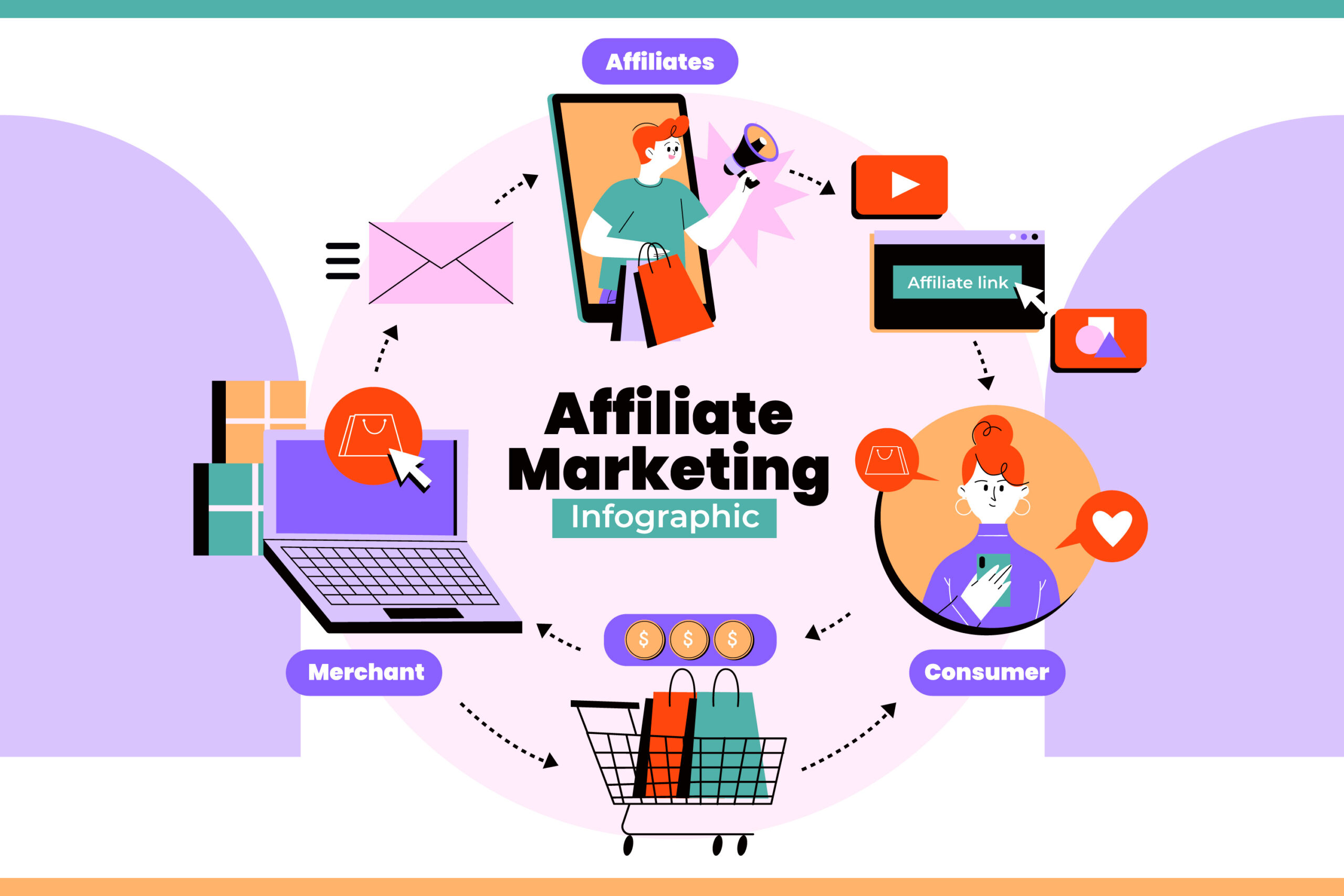
Mastering Email Marketing
Crafting the perfect email marketing strategy requires a mix of personalization and timing.
And the most important thing when you start email marketing is to understand how to calculate Conversion rate of your Email campaign
Start by building well-segmented contact lists that cater to customer preferences, forming the foundation of an effective strategy.
When executed successfully, email marketing embodies a targeted communication approach. Regularly analysing data provides insights into what works, adjusting strategies for continuous improvement.

OTT Advertising Essentials
OTT advertising leverages streaming services to target audiences where they’re spending time.
Streaming platforms like Netflix and Hulu have transformed content consumption. By 2021, OTT ad spending in the U.S. alone reached $9.03 billion.
Measurable and Targeted
In New Zealand and beyond, OTT lies in its ability to provide targeted ads. To maximize benefits, ensure content is engaging and relevant. Collaborating with experienced creatives maintains engagement.
OTT advertising is not just a trend; it’s a vital strategy for sustained consumer engagement.
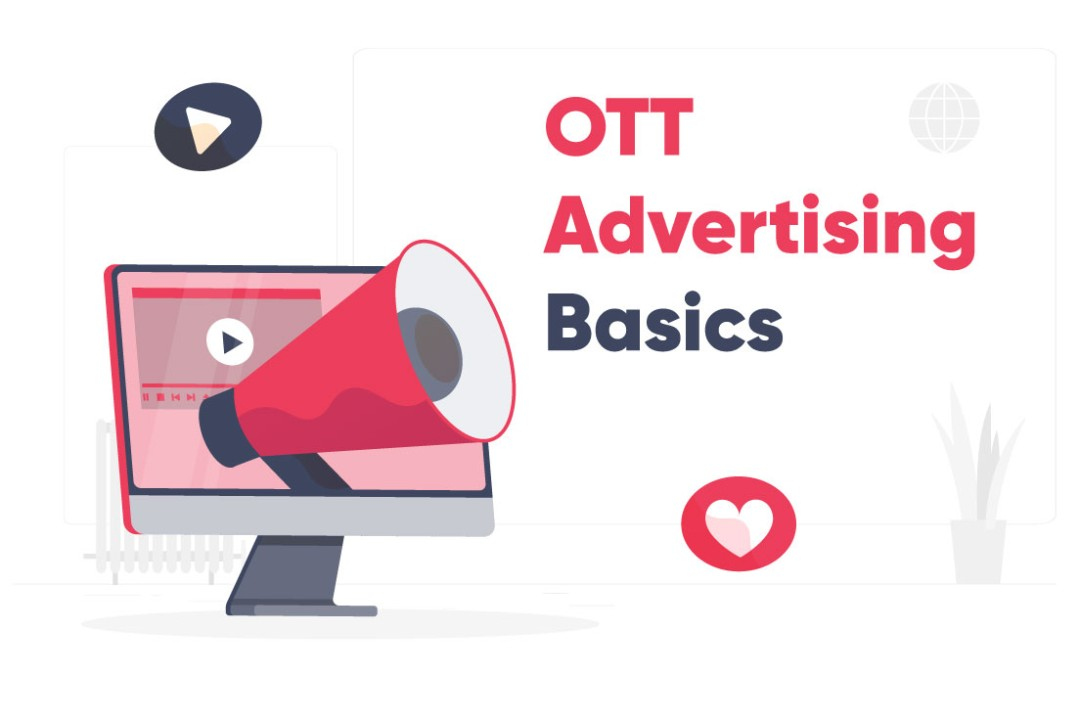
SMS Marketing Strategies
SMS marketing thrives when messages deliver value and encourage action.
Design messages with a personal touch. Including exclusive offers tailored to preferences can increase engagement rates.
Always ensure a straightforward call-to-action. Additionally, integrate SMS with other channels for seamless experience.
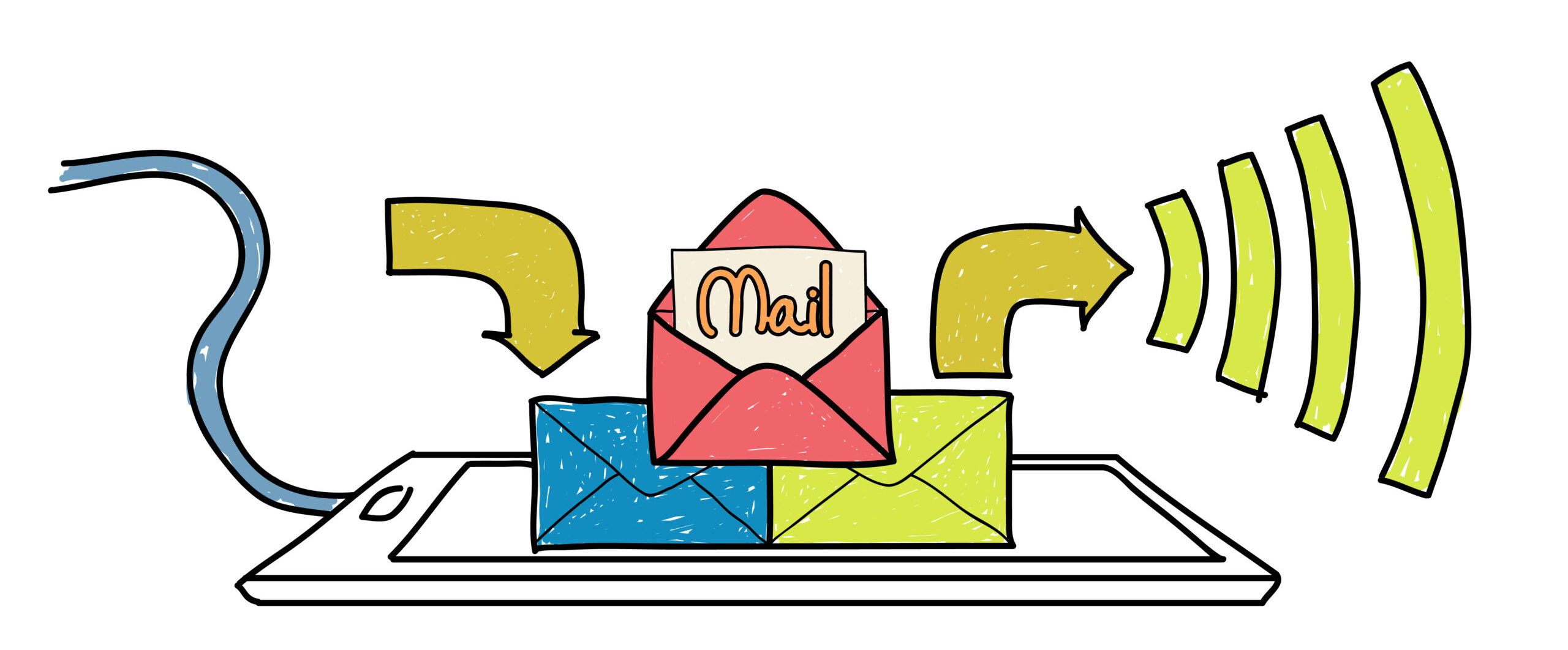
Integrating Omnichannel Digital Marketing
Integrating omnichannel digital marketing requires creating a cohesive strategy across platforms.
In 2021, Stat Counter revealed over 55% of web traffic came from mobile devices. This underscores the necessity for mobile-friendly strategies.
Consistency is key in building trust and loyalty. Studies show businesses using multiple channels experience a significantly higher purchase rate. Analyse consumer interactions to deliver a consistent brand story.
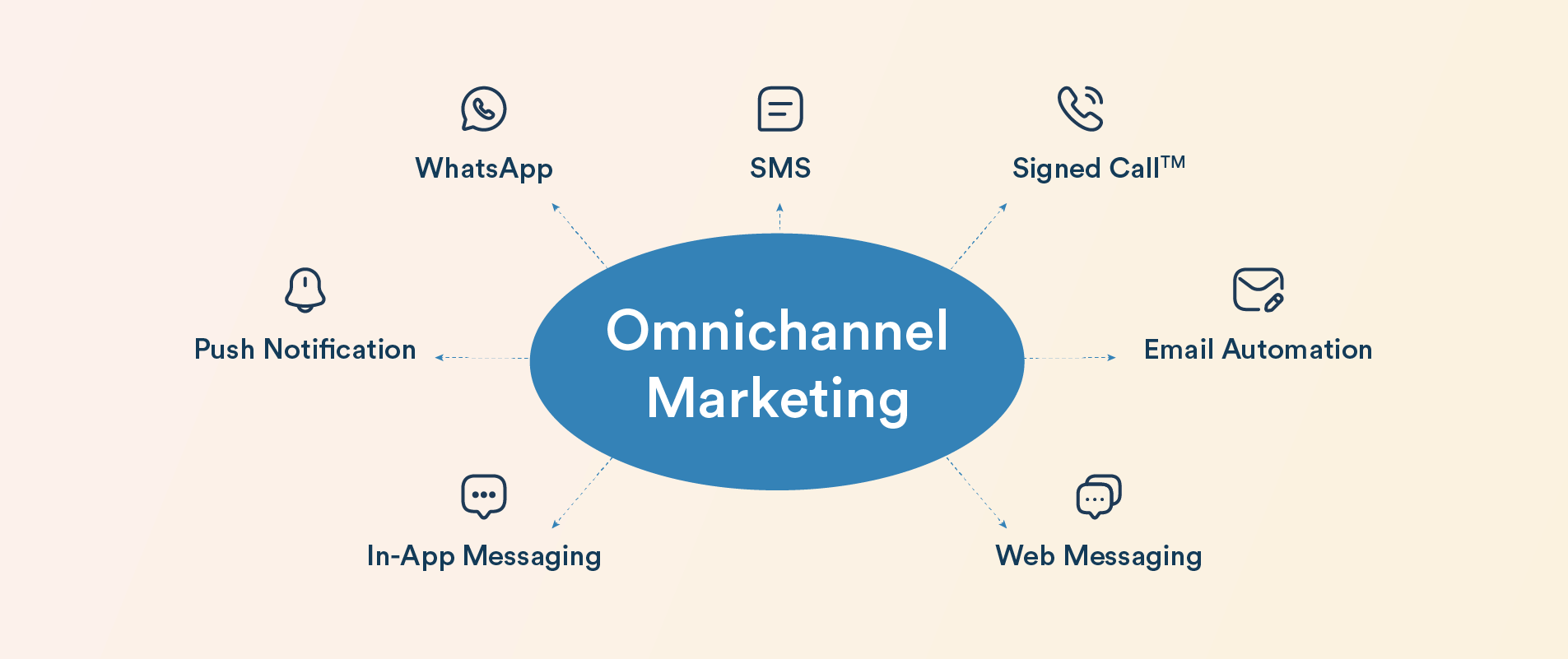
Image Source: CleverTap
Steps to Create a Digital Marketing Strategy
Setting SMART goals—specific, measurable, achievable, relevant, and timely—is essential for any marketing strategy. While you might have numerous goals in mind, it’s important to focus on those that will drive your strategy forward rather than keep it stagnant.
Researching Your Audience
Understanding your audience drives your strategies.
68% of marketers say using audience data improves conversion rates. Identifying communication channels and tailoring messaging enhances the overall experience.
Setting Clear Goals and KPIs
Setting clear goals and KPIs is crucial for tracking progress.
KPIs guide efforts by measuring campaign performance. Choose indicators reflecting your marketing endeavours. A structured approach ensures a progressive trajectory toward success.
Selecting the Right Marketing Channels
Choosing marketing channels can seem overwhelming but is crucial.
Assess goals and target audience to narrow down options. Each channel has unique strengths, understanding nuances allows your brand to flourish. Track performance to determine ROI and adjust strategies as needed.
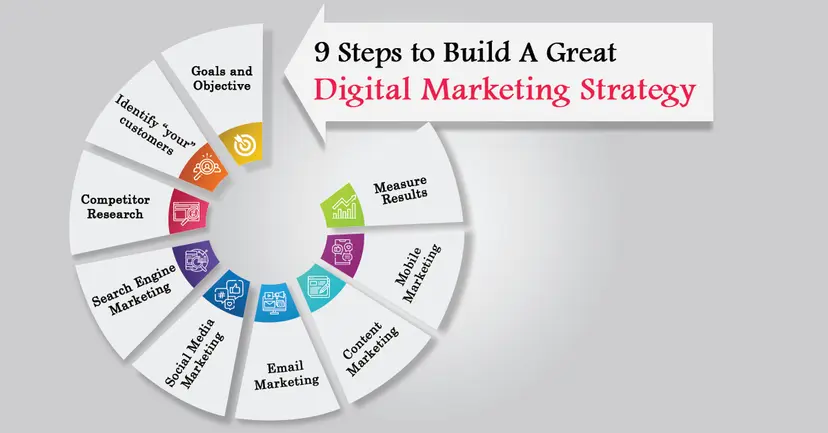
Image Source: GeekChip
Digital Marketing Challenges
The digital landscape presents unique challenges for marketers. With digital channels multiplying rapidly, marketers must stay updated and learn how to use them effectively. Analyzing and leveraging the vast amount of data from these platforms can also be daunting.
Moreover, consumers are bombarded with digital ads and distractions, making it increasingly difficult to capture their attention.

How Can You Become a Digital Marketer?
To become a digital marketer, you’ll need strong writing and social media skills, along with a solid grasp of data analytics. Most digital marketing positions require a bachelor’s degree, but taking digital marketing courses or attending a digital “boot camp” can also be beneficial. Completing an internship during your studies can provide valuable experience. While a master’s degree in digital marketing can be helpful, it’s not essential.
Key Skills Needed in Digital Marketing
Successful digital marketers need strong communication skills to effectively convey a company or product’s story to potential customers. Data analytics skills are crucial for assessing the performance of marketing campaigns and identifying areas for improvement. Additionally, proficiency in social media is a must.

Partnering with a Digital Marketing Agency
Digital marketing offers vast options for growth, but navigating complexities can be daunting.
The right agency can be your strategic partner. Partnering with professionals ensures campaigns are data-driven and on trend. Agencies provide insights from various sectors, which can be a game-changer.
A digital marketing agency alleviates the pressure of keeping up with algorithms and offers tailored strategies for your needs. With their support, you’ll be equipped to target new audiences and maintain high engagement rates.
